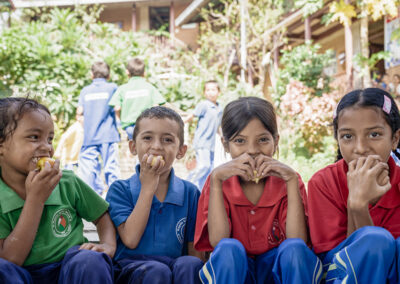Recent education policy changes in China are impacting schools in the country, notably the schools that offer an international education. Several government changes in the last 18 months are gaining public attention as impact of the regulations is becoming visible.
Impact of school name changes in China
One example of this was a directive to all private schools in China, issued by the Chinese government in May 2021, to not include certain words in their school names. Included in this list were the words ‘China’, ‘international’, and references to foreign places and educational institutions including the names of foreign public schools. As a result, schools are beginning to announce school name changes. King’s College School Chengdu has already changed its name to Dipont KCS Chengdu, and International Department of Guokai School has been renamed Guokai Bilingual School. Other schools are also in the process of making changes.
A similar ministerial decree restricting the names used by international schools in Indonesia was issued by the Indonesian government in 2015. However, this did little to curb admissions enquiries and enrolments by local Indonesian families. It is believed that demand by local Chinese parents for international education in China will continue regardless of school name changes.
Other regulations for international education in China
Regulations impacting international schools in China are complex and have been for some time. They differ depending on the school type and the children who can be enrolled. Some regulations are official, such as a ban in bilingual schools (also known as Chinese-owned private schools) on the use of foreign textbooks during the compulsory years of education – which in China span grades 1 to 9 (ages 6 to 15). Other regulations have been announced by the government, but not yet mandated, such as a plan to discourage Chinese students from studying abroad. And some regulations are, for now, speculation, such as a possible extension to the period of compulsory education. Whether authorised or not, all policy changes suggest more control over private education, particularly international education, by the Chinese government.
Regulations issued over the past two years mostly impact the compulsory years of learning within the Chinese-owned private schools that are allowed to enrol local Chinese children. However, the schools in China accessible to the children of foreign nationals i.e. the more traditional international schools that, by law, cannot enrol local Chinese children, are also likely to be under greater scrutiny from the Chinese government in the future.
This, coupled with the very strict measures placed on all people in China due to the COVID-19 pandemic, is causing significant challenges to schools and their staff.
Other challenges for schools in China
Since February 2020, schooling in some Chinese cities and provinces has been mostly off-campus, delivered through remote learning. In addition, expatriate educators working in China have found travel in and out of the country virtually impossible, other than terminating an employment contract.
As a result of the harsh containment measures, interest in China as an employment destination by expatriate workers in all sectors, particularly in education, has dropped dramatically.
International education demand and development in China continues
Demand for international education by Chinese parents continues regardless of the additional limitations. Many want the very best international higher education and career opportunities for their children. As a result, they are prepared to pay considerable fees and overcome extensive hurdles for the chance to access schooling that offers a reliable pathway for their future aspirations.
Even with the extensive impact of the pandemic on China, student enrolment at international schools in the country has increased by 3.4% over the past two years whilst the number of schools has remained relatively static, increasing by just 0.45%. Looking at ISC Research data trends for the last five years in China, student enrolment growth is 33% compared to school growth at 22%.
Despite the strict legislation, 20 schools will open in China this August (2022) to deliver international education, and at least 37 more are planned for forthcoming years. These include Chinese-based campuses for UK independent schools Wellington College, St Paul’s Girls School, and Shrewsbury School, and for the US independent and public charter school brand Basis Global.
Recruiting for schools in China
Existing and new schools in China offering international education are currently faced with a unique recruitment scenario. As a result of the harsh COVID controls, it is proving impossible for most of them to attract and recruit enough expatriate teachers. For the ISC Research Recruitment and CPD in International Schools specialist report published in October 2021, Diane Jacoutot, Managing Director of international school recruitment company Edvectus said “there has been a huge bidding war for [expatriate] teachers already in China.” However, some international schools, regardless of their location, have already realised such a model is not ideal.
There is growing recognition by some within the world’s international schools sector of the need to value and fully understand all cultures in order to avoid unconscious bias within a school’s teaching and learning community. This means that a balanced blend of teachers and school leadership from multiple cultures, experiences, and skills, who work together to learn from each other, is important for any authentic international learning environment.
Some schools in China are already developing a faculty model that reflects this outcome. Mark Bishop, Executive Headmaster at YK Pao School in Shanghai explained the model at his school in the ISC Research Mid-Market Fee International Schools white paper published in May 2021. “Attracting outstanding staff is our main challenge…In our high school, it’s about 60% expat teachers, 40% Chinese, but many of those Chinese teachers are Western university educated. “Other schools and school groups, such as Huili Education, have introduced formal training institutions to upskill all staff equally. It is a crucial and urgent investment towards diversity, equity, inclusion and justice for all within an international school community, but also addresses China’s growing recruitment challenge.
Educating current and future parents about the value of such a model is another challenge entirely.
Market data informs recruitment and admissions decisions for China’s schools
Understanding what is driving the teacher recruitment market and what remuneration offerings are attracting teachers to a particular location is informing how international schools are responding in order to remain competitive. Schools find this particularly valuable during times of challenge or high competition.
Recruitment benchmarks and competitor analyses within China’s international schools sector that ISC Research has conducted recently tell us that schools are adapting as a result. The data indicates such changes include increased salaries, new bonus and incentive packages, and additional benefits for staff and their dependents.
Similar reports to inform admissions strategies suggest that the schools in China accessible to local Chinese children continue to experience strong demand. Some of the schools that have maintained government compliance as requirements have been issued are already reporting to our field research team of a positive impact on their admissions.




